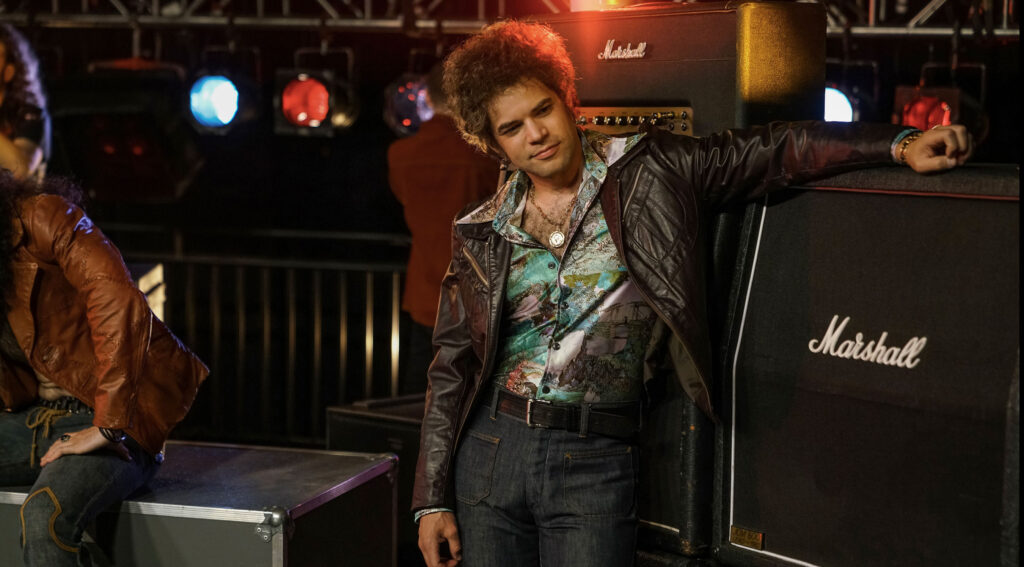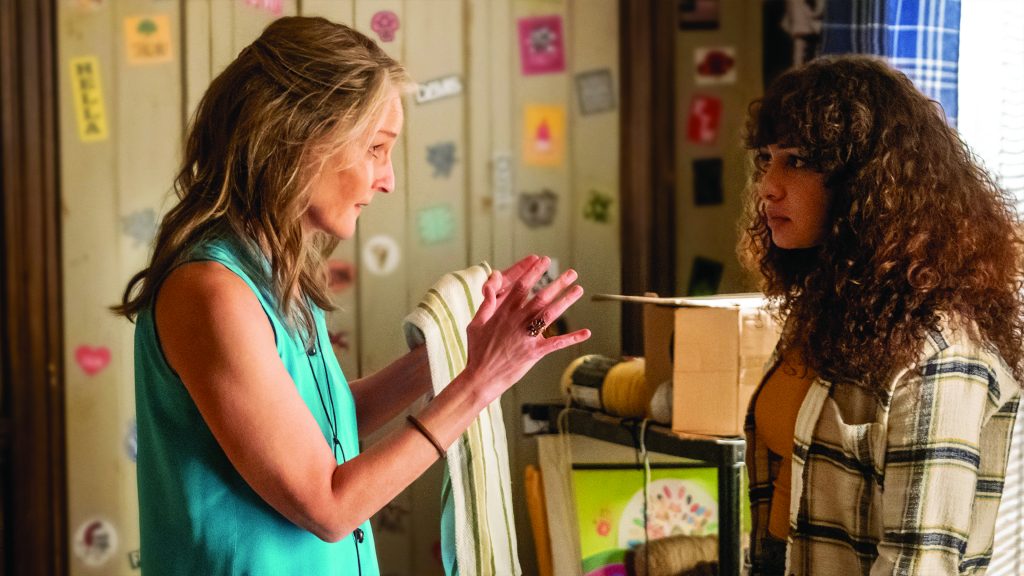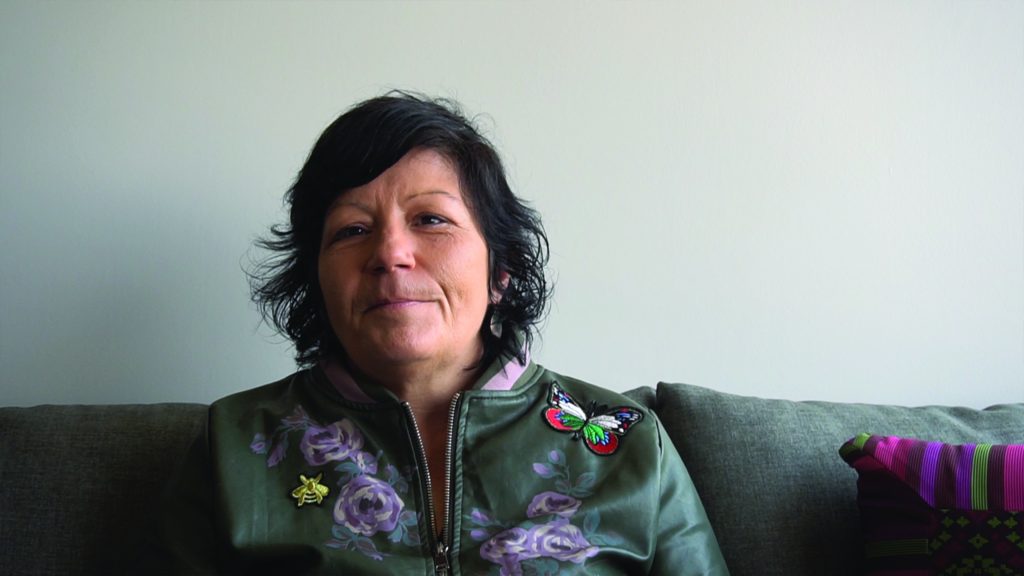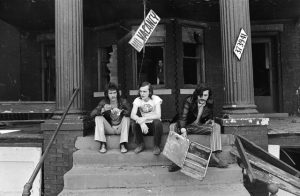March 31, 2023
by Carla Hay

Directed by Timothy Scott Bogart
Culture Representation: Taking place from 1951 to 1979, primarily in New York City and Los Angeles, the dramatic film “Spinning Gold” features a cast of white characters and African American characters (with a few Latinos) representing the working-class, middle-class and wealthy in this biopic of music mogul Neil Bogart.
Culture Clash: Bogart found hitmaking success with artists such as Donna Summer, Kiss, Gladys Knight & the Pips and the Isley Brothers, but his life was plagued by personal problems, such as marital infidelity, cocaine addiction, gambling and being millions of dollars in debt.
Culture Audience: “Spinning Gold” will appeal primarily to fans of the movie’s headliners and the artists featured in the movie, but there are noticeable factual omissions in this movie that takes a very glossy and over-exaggerated look at the movie’s protagonist.

“Spinning Gold” would be perfectly fine as a jukebox musical on stage. But as a cinematic experience, this flashy movie erases too many important facts. “Spinning Gold” makes it look like agents and attorneys didn’t exist in the 1970s music industry. This biopic of music mogul Neil Bogart also has questionable depictions of him as a music creator and innovator. This rewriting of history does a disservice and is disrespectful to the real people whose work is sidelined or removed from this movie’s story.
If you believe this movie, then you’d have to believe that Bogart was the one who told Donna Summer to make orgasmic moans in the recording studio when she recorded her breakthrough 1975 hit “Love to Love You Baby.” (These moans made the song controversial at the time and generated a lot of publicity for the song.) You’d also have to believe that Bogart made “Love to Love You Baby” a hit, simply by gluing the record to an influential radio DJ’s turntable and playing it on the radio, while enticing the DJ to be handcuffed in another room by two prostitutes. If you believe this movie, then you’d have also to believe that Bogart was the one who came up with the idea of the Kiss Army fan club, when it was actually Kiss fans Bill Starkey and Jay Evans who founded the Kiss Army, when they were teenagers in 1975.
Written and directed by Timothy Scott Bogart (one of Neil’s sons), “Spinning Gold” does tell viewers up front that this version of Neil’s story is told through a very rosy perspective of what Neil’s memories would be if he told the story himself. Neil Bogart died of cancer in 1982, when he was 39 years old. The movie is supposed to be narrated by the ghost of Neil Bogart looking back on his life. This narration is a little excessive and over-explains many things that are already shown in the movie.
As the Neil Bogart character (played by Jeremy Jordan) admits near the beginning of the film, the story presented in “Spinning Gold” isn’t very accurate: “It’s just that memories are complicated. We remember what we want to remember. We forget what we want to forget.” This trite explanation will just make viewers think that “Spinning Gold” lacks credibility. And indeed, most of the movie looks like a fairy tale, if the fairy tale had the expected clichés of sex, drugs and rock and roll in the music industry.
“Spinning Gold” certainly delivers when it comes to rousing and entertaining performances of beloved songs by artists who were signed to record companies (Buddha Records and Casablanca Records) that were led by Neil Bogart at the time. The movie features hits from Summer, Kiss, the Isley Brothers and Parliament, among others. To their credit, the “Spinning Gold” cast members who perform these songs use their real voices instead of taking the easier route of lip syncing the original recordings. Many of the acting performances are charismatic, especially by Jordan, who gives the Neil character enough roguish charm in Neil’s attempt to justify many of the sleazy and corrupt business tactics that Neil uses in the film.
However, some of the cast members are jarringly miscast and do not look convincing as the real people they are supposed to play, by looking too old for the role or by not looking anything like the real people. For example, Tayla Parx, who has the role of disco queen Summer, does not look anything like the real Summer. Casey Likes (who plays Kiss lead singer/bassist Gene Simmons) and Samuel Harris (who plays Kiss lead singer/rhythm guitarist Paul Stanley) also have no physical resemblance to the real people. In the case of Harris, he looks about 10 years older than the real age (mid-20s) that Stanley was in real life during the Kiss years that are depicted in the movie.
Many of the movie’s scenes are filmed and lighted like a stage musical, which might or might not appeal to viewers, depending on how much they like stage musicals. The cinematography, production design and costume design are among the best aspects of “Spinning Gold.” But the film editing is hit-and-miss. There’s an over-reliance on quick-cutting montages. The timeline of the story is also jumbled, as it’s told in non-chronological order, with the constant narration doing little to clear up any confusion.
The movie tells viewers from these disjointed flashbacks that Neil had a hustling entrepreneur personality from an early age. Throughout his life, Neil changed his name (his birth name was Neil Bogatz) and reinvented himself several times. Neil had a dysfunctional childhood, growing up in a working-class part of Brooklyn, New York. His father Al Bogatz (played by Jason Isaacs) worked as a mail deliverer for the U.S. Postal Service and was a gambling addict who frequently owed money to people.
A scene in the movie shows young Neil witnessing his father getting beaten up by some thugs over gambling debts. (Winslow Fegley portrays Neil as an 8-year-old child.) As a child, Neil started a laundry business using the washers and dryers in the apartment building where he lived. In a short period of time, underage Neil was making more money than his father, according to Neil. (It’s another story that sounds embellished.)
Neil’s mother Ruth Bogatz (played by Ellen David) is barely in the movie and isn’t shown speaking until much later in Neil’s life, after Neil becomes the wealthy owner of Casablanca Records, and he buys his parents a big house. The movie has repeated references to Neil having “daddy issues” of wanting to be a gambler like his father, but to become rich and successful at it, unlike his father. Although there are a few scenes of Neil gambling in casinos, his real gambles were with money in the music industry.
By the time Neil was in his late teens in 1961, Neil had changed his named to Neil Scott and became an aspiring singer and dancer. “Spinning Gold” depicts Neil meeting his first wife Beth Weiss (played by Michelle Monaghan) while he’s working in a ballroom at a hotel owned by her father. She’s seated at the same table as her sister Nancy (played by Peyton List), who would later become one of Neil’s record promoters. Neil asks Beth to dance, and she says that she doesn’t dance with the staff.
And then, the next thing you know, Beth and Neil are slow dancing by themselves on the dance floor, while everyone in the ballroom watches them. Neil clutches Beth from behind, and he asks her to tell him what she dreams about at night. Neil can sense that Beth wants to break out of her “pampered princess/good girl” image that she has and hook up with a “bad boy,” just to annoy her domineering father. And Neil is right.
Neil soon becomes a small-time pop star, when he’s able to win a local radio contest hosted by Murray the K (a famous New York radio DJ) where listeners could vote for Neil’s song “Cherry on Top” versus whatever was Elvis Presley’s latest single at the time. Neil shrewdly knew that only local people would be voting, so he figured out a way to get enough votes. (The movie never shows how.) He gets a lot of publicity for being an artist who received more listener votes than Presley. “Cherry on Top” becomes a minor hit. Neil eventually ended up as a one-hit wonder, but he got a taste of the music business, and he was hooked.
Neil and Beth were married in 1964, and they later had three children together: Jill, Tim and Bradley. (In the movie, their daughter’s name is spelled Jill. In real life, her name is spelled Jylle.) By 1964, Neil had changed his name to Wayne Stewart and Wayne Roberts when he had a short-lived stint as a porn actor (a scene in “Spinning Gold” shows Neil saying he made porn to pay for Beth’s engagement ring) and as a record promoter for MGM Records. Neil’s porn work isn’t recreated in “Spinning Gold” but Neil’s wheeling and dealing in the music industry are depicted in ways that are both overly sentimental and cynically selective.
His first big hit for MGM was Sam the Sham and the Pharoahs’ 1964 pop-rock song “Wooly Bully.” He is also shown bribing local record stores to carry this single as a way to increase sales. Eventually, Neil became the president of MGM Records. His MGM experiences breeze by in the film in many quick montages. Later in the movie, there is brief acknowledgement that Beth taught Neil most of what he learned about accounting and other business skills he would need in a managerial position.
Bribing people to promote or sell music (also called “payola”) was a tactic that “Spinning Gold” admits that Neil used throughout his career and is shown in multiple scenes in the film. There was a U.S. government crackdown on music industry payola in the late 1980s and early 1990s, but payola was openly done before then. Payola hasn’t gone away, but people aren’t as blatant about it as they were in Neil Bogart’s heyday.
The payola bribery would be through cash, drugs, prostitutes, high-priced gifts and other ways for people to be persuaded by whoever was giving out these bribes. “Spinning Gold” portrays influential New York radio DJ Frankie Crocker (played by Chris Redd) as being a frequent recipient of payola. In the movie, Neil justifies it by saying that no one he bribed ever played music that they didn’t want to play. It’s a statement that sounds as phony as a $3 bill.
“Spinning Gold” shows that Neil (now going by the name Neil Bogart) left MGM Records to have even greater success at Buddah Records. The movie’s opening scene takes place in 1967. It depicts Neil showing up at an African American church where the Edwin Hawkins Singers are performing “Oh Happy Day” as the church choir. Edwin Hawkins (played Obi Abili) is sitting at the side of the altar, while Neil tries to persuade Edwin to sign this choir to a record deal.
Neil is convinced that “Oh Happy Day” will be the first gospel song to be a major crossover pop hit. And in order to convince Edwin, Neil takes wads of cash out of his briefcase. And then, when Neil is sure he’s sealed the deal, he joins the choir on stage and sings in front of them, as if he’s the star of the show. It’s a crassly corny and unrealistic scene. Neil tells the “Spinning Gold” audience in one of his many voiceovers that is not how it happened in real life, but that’s the way he wants to remember it.
Neil’s other successes at Buddha that are depicted in “Spinning Gold” include signing Gladys Knight & the Pips, the Isley Brothers and Bill Withers. Gladys Knight (played by Ledisi) is shown in a somewhat amusing scene where Gladys and Neil are in the recording studio. She convinces him that the song “Midnight Plane to Houston” should be changed to “Midnight Train to Georgia,” which was a hit for Gladys Knight & the Pips in 1973. It’s one of the few times in the movie that someone other than Neil is shown coming up with an idea that would turn out to be a hit. Gladys Knight & the Pips signed with Buddha Records after leaving Motown Records.
“Spinning Gold” also depicts Neil as the one who came up with the riffs for the Isley Brothers’ 1969 hit “It’s Your Thing.” In real life, Ronald Isley, O’Kelly Isley Jr. and Rudolph Isley wrote “It’s Your Thing,” but the movie makes it looks like Neil was an uncredited writer for the song. Neil persuades Ronald Isley (played Jason Derulo), who is shown as the leader of the Isley Brothers, to have the Isley Brothers leave Motown Records for Buddha Records, because Neil promised the Isley Brothers could have their own record label, with Buddha as distributors.
The segment on Withers is also portrayed as Neil being able to “poach” another artist from Motown. According to the story presented in “Spinning Gold,” Bill Withers (played by Pink Sweats) was close to signing Motown, but Neil discovered the young singer and convinced him to sign instead to Sussex Records, a spinoff of Buddha Records. “Spinning Gold” features performances of the Withers hits “Ain’t No Sunshine” and “Lean on Me.”
As a result of Motown “losing” Gladys Knight & the Pips, the Isley Brothers and Withers because of Neil’s business persuasions, the movie depicts Neil getting “punished” for it. There’s a segment showing Neil getting roughed up by goons who were sent by Motown founder Berry Gordy. This attack happens in front of some of Neil’s record company colleagues who are in Neil’s inner circle. Neil then implies to the thugs that he has connections with the Italian Mafia, so the attackers back off from this assault. It’s all handled in a very flippant way in the movie, as if to show that Neil could talk his way out of anything.
By this time, Neil’s team at Buddha included his best friend Cecil Holmes (played by Jay Pharoah), who worked in promotions and artists and repertoire (A&R); sister-in-law Nancy, who worked in promotions; Buck Reingold (played by Dan Fogler), who worked in publicity and would become Nancy’s husband; and Neil’s cousin Larry Harris (played by James Wolk), who started as a record promoter and later became an executive vice president at Casablanca Records. Cecil is the only one in this group who is shown questioning some of Neil’s wild spending, or standing up to Neil when Neil’s ego gets out of control.
All of these team members would continue to work with Neil when he left Buddha in 1973, to launch his own label: Casablanca Records. This new venture also meant that Neil, Beth and their children would relocate to Los Angeles, where Casablanca was headquartered. In real life, Bogart, Holmes, Reingold and Harris are listed as co-founders/partners of Casablanca. In “Spinning Gold,” Bogart is depicted as the sole founder and the only one who decided to eventually sell 49% of Casablanca to Polygram.
At the time Casablanca was launched, Kiss was the only act signed to Casablanca, which had a distribution deal with Warner Bros. Records. Kiss was selling out concerts, but the band’s albums were flops early in the band’s career. An early scene in “Spinning Gold” shows a lavish launch party for Casablanca being a showcase for a Kiss performance. (The Kiss song “Shout It Out Loud” is performed in this scene, even though “Shout It Out Loud” wasn’t released until 1976, about three years after this party scene is supposed to take place.)
The party ends in disaster because all the smoke from the smoke machines on stage set off the room’s sprinklers, sending drenched partygoers out the door. And what does Neil do? He dances with his daughter Jill (played by Sloane Bogart) while water rains down from the sprinklers, because he promised her a dance at the party. Some people might consider this scene to be endearing, while others will find it annoying in its sappy phoniness.
“Spinning Gold” shows the friction that Neil and his Casablanca cronies had with the executives at Warner Bros., particularly Warner Bros. Records chief Mo Ostin (played by Nick Sandow), who was starting to see Casablanca as a very bad investment. Casablanca was heavily in debt to Warner Bros., for about $5 million to $6 million, with no hit artists on Casablanca. Warner Bros. eventually cut its losses and ended its deal with Casablanca in 1974. The movie depicts it as a situation where Neil basically told Mo a version of “You can’t fire me because I quit.”
As a completely independent label in 1974, Casablanca was still losing millions of dollars from overspending. It didn’t help that Neil had a drug problem and a gambling habit. The company’s first release as a fully independent label was an album compilation of Johnny Carson’s “Tonight Show” highlights titled “Here’s Johnny: Magic Moments From the Tonight Show,” which was a major bomb for Casablanca.
Other acts on Casablanca weren’t making hits. George Clinton (played by Wiz Khalifa), lead singer of the funk group Parliament, convinces Neil that the band needs a high-priced spaceship that operates on stage during the band’s concerts. George brags in the movie that everyone else in the band got new cars from Casablanca, but he got a spaceship. Parliament songs “Give Up the Funk (Tear the Roof Off the Sucker)” and “Mothership Connection (Star Child)” are performed in “Spinning Gold.”
There are several scenes of Neil negotiating directly with artists, with no mention of agents and attorneys, who are never shown in this movie. People with extensive knowledge of the music industry of the 1970s are the most likely to notice all the mistakes that “Spinning Gold” makes about how the music industry worked back then and, to a certain extent, still works now. These music aficionados are among the people in this movie’s target audience, so it matters tremendously whether or not “Spinning Gold” has credibility with a great deal of the audience.
The only artist managers (not the same as agents) who are depicted in the movie are Kiss co-managers Bill Aucoin (played by Michael Ian Black) and Joyce Biawitz (played by Lyndsy Fonseca), who is portrayed as someone who started off having a transactional extramarital affair with Neil soon after they met, but they eventually fell in love with each other. Neil says in the movie that he was in love with Beth and Joyce at the same time.
Joyce would become Neil’s second wife in 1976, but their wedding is never shown in the movie, and neither is the birth of their son Evan, nicknamed Kidd. Fonseca, who has believable chemistry with Jordan, gives one of the standout non-musical performances in “Spinning Gold” as quick-thinking and ambitious Joyce. Neil says in one of the movie’s many voiceovers that Joyce reminded him a lot of himself.
One of the movie’s best scenes is an argument about Kiss’ future with Casablanca Records. Kiss co-manager Bill and Kiss members Gene and Paul are on one side; Neil is on the other side; and Kiss co-manager Joyce is caught somewhere in between, but she’s leaning toward siding with Neil. It’s the only scene in the movie that realistically calls out Joyce’s conflict of interest of being an artist manager while also being romantically involved with the artist’s record company president, who is in disputes with the artist for underpaying the artist.
The story behind Kiss’ big hit ballad “Beth” is depicted as the band’s way of making fun of the love triangle between Beth, Neil and Joyce. Neil and Joyce are shown as being very offended by the song, which wasn’t released until 1976, a few years after it was written. The movie never bothers to show how Beth felt about a song that was supposedly named after her. “Spinning Gold” also shows that there were disagreements between band members, the band’s management and Casablanca executives over whether or not this bittersweet ballad was the right fit for Kiss’ image as a fun-loving, partying rock band. (Kiss’ 1975 signature anthem “Rock and Roll All Nite” is performed in “Spinning Gold.”)
There were other complications with “Beth” that the movie doesn’t detail. “Beth” had lead vocals by Kiss drummer Peter Criss (played by Alex Gaskarth, who performs the song in the movie). There were ego issues with Simmons and Stanley, who were the main lead singers and songwriters of Kiss and were not involved with writing the song. In real life, even though Criss got a co-songwriting credit for “Beth,” there have been reports that he actually didn’t have anything to do with writing the song, whose co-songwriters are Stan Penridge and Bob Ezrin.
Casablanca still had massive financial problems in the record company’s first few years. Casablanca was millions of dollars in debt to Warner Bros. Records—a debt that Neil says he later paid off when Casablanca became profitable. Neil was also taking out personal loans for Casablanca and for his gambling. A Mafia-type thug named Big Joey (played by Vincent Pastore) shows up in the movie occasionally to loan money to Neil and make threats when Neil doesn’t pay back his debts on time. There’s a scene in the movie where Neil gets assaulted by some of Big Joey’s thugs, and Neil says in the narration that it’s sadly ironic how Neil became just like his father.
As depicted in “Spinning Gold,” Casablanca’s blockbuster success really happened because of disco queen Summer, who had a string of big hits with Casablanca from 1975 to 1979, including “Bad Girls,” “Dim All the Lights” and “Last Dance,” which are performed in the movie. The success of Summer began when Casablanca re-released Summer’s “Love to Love You Baby” as a 17-minute single. And you guessed it: Neil is credited with coming up with this idea, which he took credit for in real life. “Love to Love You Baby” was written by Giorgio Moroder, Summer and Pete Bellotte, but you get the feeling that if “Spinning Gold” could get away with it, the movie would want to give credit to Neil Bogart for co-writing the song too. Bellotte was the producer of “Love to Love You Baby,” but “Spinning Gold” erases him completely from the movie.
The scene depicting Summer re-recording “Love to Love You Baby” is quite ludicrous, even though the movie wants this scene to be sexy. The scene shows almost everyone in the studio, including music producer Giorgio Moroder (played by Sebastian Maniscalco, wearing a very bad wig and having a questionable Italian accent), storming out in disgust because Neil insists that the song will be released as a single that’s more than 15 minutes long. Everyone except Neil thinks the song will flop because radio stations won’t play a song of this length.
The only people left in the studio are Donna and Neil, who then takes over the role as producer. Neil coos in Donna’s ears and rubs up against her to “motivate” her to sound sexier as she sings and moans the song. It reaches a point where Donna is lying on her back on the studio floor and almost masturbating while she’s still recording the song. The scene gives the impression that if Donna started using her microphone as sex toy, then Neil would’ve been right there grinning along, as long as it meant that the song would be a big hit.
“Spinning Gold” makes it look like Neil generously spent a lot of money on his artists because he believed in them wholeheartedly. There’s no question that he had a strong belief in his artists. However, the movie irresponsibly avoids detailing the exploitation that is only hinted at in certain scenes. In one scene, Donna is shocked to find out that Neil changed her real name to the stage name Donna Summer (her birth name was LaDonna Gaines) without her knowledge and permission. This type of exploitation is quickly mentioned once and then never mentioned again.
Not surprisingly, “Spinning Gold” never mentions the real-life lawsuits that artists (including Summer) filed against Casablanca when Neil Bogart was in charge of the company. Summer would eventually leave Casablanca and signed a deal with Geffen Records in 1980. Her split from Casablanca is also not in the movie. In a “Spinning Gold” scene, Neil says in a voiceover that he and Casablanca Records completely fabricated and controlled her image and that Summer’s real personality was hidden from the public.
The problem with “Spinning Gold” is you can’t make those kinds of statements without backing it up with something substantial. It’s a well-known fact that in real life, Summer came from a religious background, and she was deeply conflicted about the sex-oriented disco music she was making. But in “Spinning Gold,” this inner conflict is just cavalierly mentioned in a throwaway line where Donna says that she’s worried about what her mother will think about “Love to Love You Baby.”
The movie also never fully explores the damage that Neil’s infidelity and divorce did to his first wife Beth and their children. There’s a scene where Beth and Neil separate (it’s clear that she’s the one who dumped him), long after she knows he’s having an affair with Joyce. He selfishly says to Beth: “You’re breaking my heart.” Beth replies that now he knows how it feels. The children’s feelings are nowhere to be seen in this movie.
Neil’s cocaine addiction is shown in several scenes, but the movie ultimately glosses over this addiction. It’s never shown if he ever sought professional help for this addiction, or if anyone close to him urged him to go to rehab. The closest that a loved one comes to pointing out that Neil’s addiction is a big problem is his father Al, in a scene where Al visits Neil at Neil’s home in California. Al is alarmed that Neil is openly snorting cocaine in front of him. Al scolds Neil a little bit by telling him that drugs will make Neil do stupid things, but then Neil sends Al on his way after giving Al some cash as a gift/handout.
Much of “Spinning Gold” depicts Neil’s showmanship ability to get media attention for publicity stunts that the movie credits him for creating. It’s questionable if he came up with all of those ideas himself in real life. And the one publicist depicted in the movie (Buck) is hardly shown doing any work at all. He’s just portrayed as a minion who parties a lot, occasionally gets into physical fights, and shows up at meetings to agree with what Neil says.
Noticeably absent from the movie: Cher, who was briefly signed to Casablanca Records, which released two Cher albums (“Take Me Home” and “Prisoner”) in 1979. Cher’s biggest hit song for Casablanca was the title track to “Take Me Home,” which hit No. 8 on the Billboard Hot 100 chart and was certified gold in the United States. Cher’s omission from “Spinning Gold” is probably because the filmmakers couldn’t get the rights her music and because the movie quickly mentions toward the end that Neil left Casablanca by 1980. That was the year that Polygram bought the remaining shares of Casablanca, and when disco’s popularity was on the decline.
The Village People (Casablanca Records’ admittedly manufactured pop group, with most of the original members not having any singing talent) are quickly mentioned and shown in non-speaking roles toward the end of “Spinning Gold.” The movie doesn’t mention Neil Bogart’s failed attempt to become a hit filmmaker: He was an executive producer of the 1978 disco comedy flop “Thank God It’s Friday,” starring Summer, Valerie Landsburg, Jeff Goldblum, Terri Nunn (future lead singer of Berlin) and Debra Winger.
Also not mentioned in “Spinning Gold”: After leaving Casablanca, Neil founded Boardwalk Records, whose biggest breakout act in the early 1980s was Joan Jett and the Blackhearts. “Spinning Gold” is already overstuffed with a jumbled narrative, so adding these details wouldn’t help the movie anyway.
“Spinning Gold” is at its best when it’s about nostalgia for 1960s and 1970s music. But this movie is supposed to be a biopic, not a music compilation. Although “Spinning Gold” has some talented cast members who do the best they can with the material that they’ve been given, other cast members look like they don’t belong in this movie. And no matter how many times a scripted drama will take liberties with facts in telling the story of a real person, audiences still expect a core of authenticity in telling the story. A more accurate title for “Spinning Gold” is “Spinning the Truth.”
Hero Partners and Howling Wolf Films released “Spinning Gold” in select U.S. cinemas on March 31, 2023.






